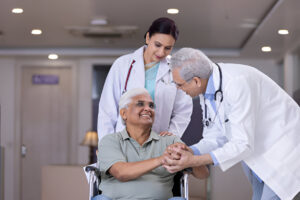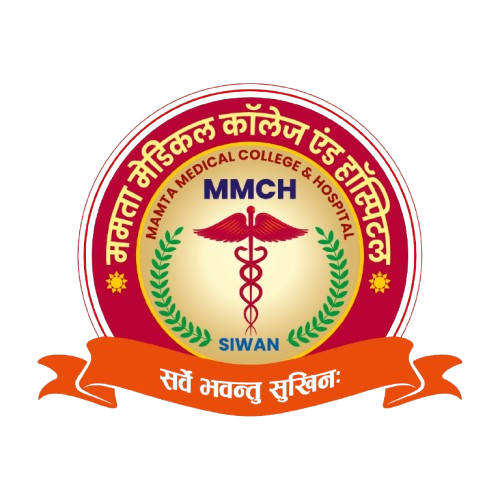
Department of Physical Medicine & Rehabilitation
Mamta Medical College & Hospital, Siwan (MMCH)
The Department of Physical Medicine & Rehabilitation (PMR) at Mamta Medical College & Hospital, Siwan, is dedicated to restoring function, improving quality of life, and promoting independence for patients suffering from physical disabilities due to injury, disease, or congenital conditions. We focus on comprehensive rehabilitation through multidisciplinary approaches, advanced therapeutic techniques, and personalized care plans that empower patients to regain mobility, strength, and self-reliance.
🌟 Vision & Mission
Vision:
To be a premier center of excellence in Physical Medicine & Rehabilitation, recognized for innovative patient-centered care, education, and research that significantly enhances the lives of individuals with disabilities.
Mission:
To provide holistic and evidence-based rehabilitation services aimed at maximizing patients’ physical, psychological, and social functioning.
To foster a multidisciplinary approach involving physicians, therapists, nurses, and counselors in delivering integrated rehabilitation care.
To train healthcare professionals and students in advanced rehabilitation techniques and principles.
To conduct research and develop innovative rehabilitation strategies tailored to regional needs.
To raise awareness about disability prevention, early intervention, and community reintegration.
🏥 Scope of Services
The Department of Physical Medicine & Rehabilitation at MMCH offers a comprehensive range of services to patients across all age groups with diverse rehabilitation needs:
Neurological Rehabilitation
Rehabilitation for patients recovering from stroke, traumatic brain injury, spinal cord injury, multiple sclerosis, and other neurological disorders.
Focus on improving motor function, coordination, balance, and cognitive skills through physiotherapy, occupational therapy, and speech therapy.
Musculoskeletal Rehabilitation
Management and rehabilitation of patients with fractures, joint injuries, arthritis, back pain, and post-operative orthopedic conditions.
Use of therapeutic exercises, manual therapy, electrotherapy, and assistive devices to restore mobility and reduce pain.
Pediatric Rehabilitation
Specialized programs for children with developmental delays, cerebral palsy, muscular dystrophy, and congenital deformities.
Emphasis on early intervention to promote normal growth, motor skills development, and functional independence.
Geriatric Rehabilitation
Tailored rehabilitation plans for elderly patients to address age-related disabilities, osteoporosis, arthritis, and balance disorders.
Prevention of falls, maintenance of independence, and improvement in quality of life.
Cardiopulmonary Rehabilitation
Post-hospitalization rehabilitation for patients with chronic respiratory diseases, heart surgery, and other cardiopulmonary conditions.
Supervised exercise programs, breathing techniques, and lifestyle counseling.
Pain Management & Sports Medicine
Comprehensive management of chronic pain, sports injuries, repetitive strain injuries, and post-traumatic pain syndromes.
Use of pharmacological, physical, and psychological approaches for pain relief and functional restoration.
👩⚕️ Multidisciplinary Rehabilitation Team
Our department is staffed by a dedicated team of healthcare professionals specializing in rehabilitation medicine:
Physiatrists: Physicians specialized in Physical Medicine & Rehabilitation who lead the diagnostic, treatment, and rehabilitation planning.
Physiotherapists: Experts in movement therapy, exercise prescription, and manual techniques to improve physical function.
Occupational Therapists: Specialists who help patients regain skills for daily living and workplace activities.
Speech & Language Therapists: Providing therapy for speech, swallowing, and communication disorders.
Rehabilitation Nurses: Providing nursing care tailored to patients with disabilities and complex rehabilitation needs.
Psychologists & Social Workers: Supporting patients and families with coping strategies, counseling, and social reintegration.
Orthotists & Prosthetists: Designing and fitting braces, orthoses, and prosthetic limbs to enhance mobility and independence.
🏥 Facilities & Technologies
The Department of Physical Medicine & Rehabilitation at MMCH is equipped with modern infrastructure and advanced technologies, including:
Physiotherapy Gymnasium: Fully equipped with therapeutic exercise equipment, treadmills, balance trainers, and resistance devices.
Electrotherapy Unit: Offering modalities like ultrasound therapy, transcutaneous electrical nerve stimulation (TENS), interferential therapy, and laser therapy.
Hydrotherapy Pool: For aquatic therapy that reduces joint stress and promotes muscle strengthening.
Assistive Devices & Mobility Aids: Customized wheelchairs, walkers, orthotic braces, and prosthetics tailored to individual patient needs.
Gait Analysis & Motion Laboratory: For precise assessment of walking patterns and designing rehabilitation plans.
Speech Therapy & Swallowing Clinic: Equipped with tools for detailed assessment and therapy of communication and swallowing difficulties.
🔬 Research & Innovation
Our department is committed to advancing rehabilitation medicine through clinical and applied research:
Studies on rehabilitation outcomes in neurological and musculoskeletal disorders.
Development of innovative prosthetic and orthotic solutions.
Research on pain management techniques and non-pharmacological therapies.
Evaluation of rehabilitation models in rural and urban populations.
Collaborations with national and international rehabilitation centers to adopt best practices and novel technologies.
🤝 Patient-Centered Care & Rehabilitation Philosophy
At MMCH, the rehabilitation process is patient-centric and holistic:
Individualized Rehabilitation Plans: Each patient receives a customized program based on detailed assessment and goals.
Goal-Oriented Therapy: Focus on maximizing functional independence and quality of life.
Family Involvement: Active participation of family members in rehabilitation and home care strategies.
Psychosocial Support: Addressing emotional and social challenges associated with disability.
Continuum of Care: Coordination from inpatient rehabilitation to outpatient follow-ups and community reintegration.
📢 Community Outreach & Disability Prevention
The department actively engages in community programs to:
Promote awareness about prevention of disabilities caused by accidents, infections, and chronic diseases.
Conduct screening camps for early detection of disabilities.
Educate the public on ergonomics, posture correction, and lifestyle modifications.
Support disabled individuals with counseling, vocational training, and social rehabilitation.
Partner with government and non-government organizations to enhance disability rights and access to rehabilitation services.
